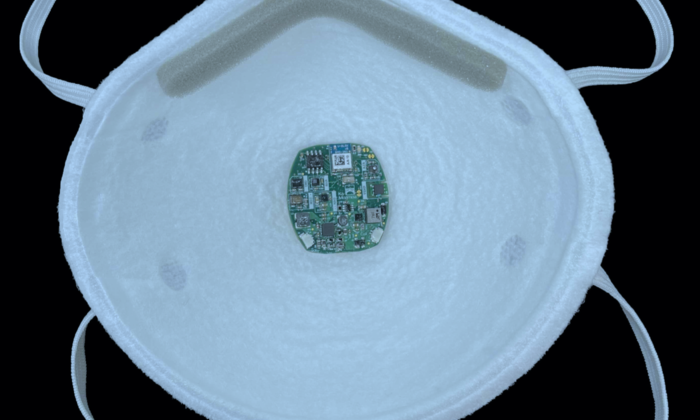
A team of engineers at Northwestern University in Illinois has developed a new lightweight smart sensor platform that can be attached to any N95, cloth or surgical face mask.
Dubbed FaceBit, the sensor is about 25 millimetres in diameter and can be attached to the inside of face mask using a tiny magnet. It can sense the user’s real-time respiration rate, heart rate and mask-wear time, and then wirelessly transmit the data to a smartphone app that features a dashboard for real-time health monitoring.The app can immediately alert the user when issues such as an elevated heart rate or a leak in the mask arise. The physiological data can also be used to predict fatigue, physical-health status and emotional state.
FaceBit is also designed to harvest energy from a variety of ambient sources, including the force of the user’s breathing and motion, and heat from a user’s breath and the sun, thus extending the life of the sensor’s tiny battery to more than 11 days.
‘We wanted to design an intelligent face mask for healthcare professionals that does not need to be inconveniently plugged in during the middle of a shift,’ said Josiah Hester, the Breed junior professor of design in Northwestern’s McCormick School of Engineering. ‘We augmented the battery’s energy with energy harvested from various sources, which means that you can wear the mask for a week or two without having to charge or replace the battery.’
Before designing FaceBit, the engineers interviewed doctors, nurses and medical assistants to better understand their needs for smart face masks. The results that quality of fit was the most important criterion.
To ensure that their N95 masks are properly sealed to their faces, healthcare workers periodically undergo a cumbersome 20-minute ‘fit test’. Although the FaceBit can’t yet replace this process, it can ensure that the mask retains proper fit between testing events, alerting the user if the mask becomes loose.
‘If you wear a mask for 12 hours or longer, sometimes your face can become numb,’ Hester said. ‘You might not even realize that your mask is loose because you cannot feel it or you are too burnt out to notice. We can approximate the fit-testing process by measuring mask resistance. If we see a sudden dip in resistance, that indicates a leak has formed, and we can alert the wearer.’
The device measures heart rate by sensing the subtle motion of a person’s head that occurs each time their heart beats and differentiating it from other motions. ‘Your heart is pushing a lot of blood through the body and the ballistic force is quite strong,’ Hester said. ‘We were able to sense that force as the blood travels up a major artery to the face.’
Because stressful events often elicit physiological responses, including rapid breathing, FaceBit can use that information to alert the user to take a break or take deep breaths to calm down. Hospital systems could also use these data to optimise shift and break schedules for its workers.
Tests carried out by the researchers on volunteers in real-world scenarios indicated that FaceBit’s accuracy was similar to clinical-grade devices; however, FaceBit still needs to undergo clinical trials and validation. The team has released the project as open source and open hardware so others can build and validate the device.
‘FaceBit provides a first step toward practical on-face sensing and inference, and provides a sustainable, convenient, comfortable option for general health monitoring for Covid-19 frontline workers and beyond,’ Hester said. ‘I’m really excited to hand this off to the research community to see what they can do with it.’
The research has been published in the Proceedings of the ACM on Interactive, Mobile, Wearable and Ubiquitous Technologies.


